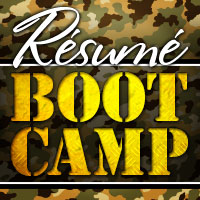 Do you feel like your résumé is missing something? Don’t feel like it has that “Ka-Pow” that it needs to grab an employer’s attention? Well, get ready to whip your résumé into shape with our new Movin’ On Up series, Résumé Boot Camp. Each week for the next month we’re going to focus on a few key ways you can add some pizzazz to your résumé to help it get the attention it deserves!
Do you feel like your résumé is missing something? Don’t feel like it has that “Ka-Pow” that it needs to grab an employer’s attention? Well, get ready to whip your résumé into shape with our new Movin’ On Up series, Résumé Boot Camp. Each week for the next month we’re going to focus on a few key ways you can add some pizzazz to your résumé to help it get the attention it deserves!
So, to kick this training off, let’s talk about your résumé summary. If you don’t have one, add one. If you already have one, read back over it and get prepared to kick it up a notch. Here are some more specifics on how to create a standout résumé summary.
Summary
Besides your contact information at the very top of your paper, the summary should be one of the first items that a prospective employer sees on your résumé. Sometimes, people think that a summary is a brief outline of what you’re looking for. Here’s an example: Seeking a position as a marketing assistant at XYZ Company. Although that might be what you’re looking for, a prospective employer already knows that you’re looking for a job because otherwise they wouldn’t be looking at your résumé.
Instead, a summary should highlight your skills as they relate to the job you’re applying for and what you can add to the company. An example of how a summary should look is: Construction supervisor with five years experience managing construction crew of 30 people, oversee production and development; establish safety codes; supervisor of the year; increased production and revenue by 40% during 2009 over 2008.
When creating your résumé summary, here are a few key tips to keep in mind.
Be brief, but specific. Don’t give all your information away in the summary. Let this be an opening to your résumé that encourages an employer to continue reading and learning more about you. Be sure to outline what you can offer the employer.
List relevant skills. In your summary, list your most relevant skills as they relate to the specific job opening. Which of those skills do you excel at the most? Write those down.
Also, describe your accomplishments. What are a few of your greatest accomplishments that would relate to the job? Is there an award you won? It’s OK to brag a little because you want the employer to know why you’re great and why they should hire you!
Use action words. Although sometimes you have to list something in past tense, try to use as many action words as possible to communicate greater intensity. And, using action verbs will more likely to grab the reader’s attention than using past tense verbs.
Format correctly. Keep the summary statement at the top of your résumé and make it short and sweet – about four sentences or less. Again, you want to grab someone’s attention with your summary, but not give away all of your information. Encourage them to keep reading. Also, be careful not to use the words “I”, “me” and “my” in your summary. Employers know you’re talking about yourself, so saying “I” or “me” in a résumé might sound amateur and unprofessional.
So, now it’s time for you to check out your summary statement or start writing it today. This is a great way to set yourself apart from the competition and stand out in an employer’s mind. Have questions about writing a summary? Let us know. Also, tune in next week to learn how to write and format your work history on your résumé.






